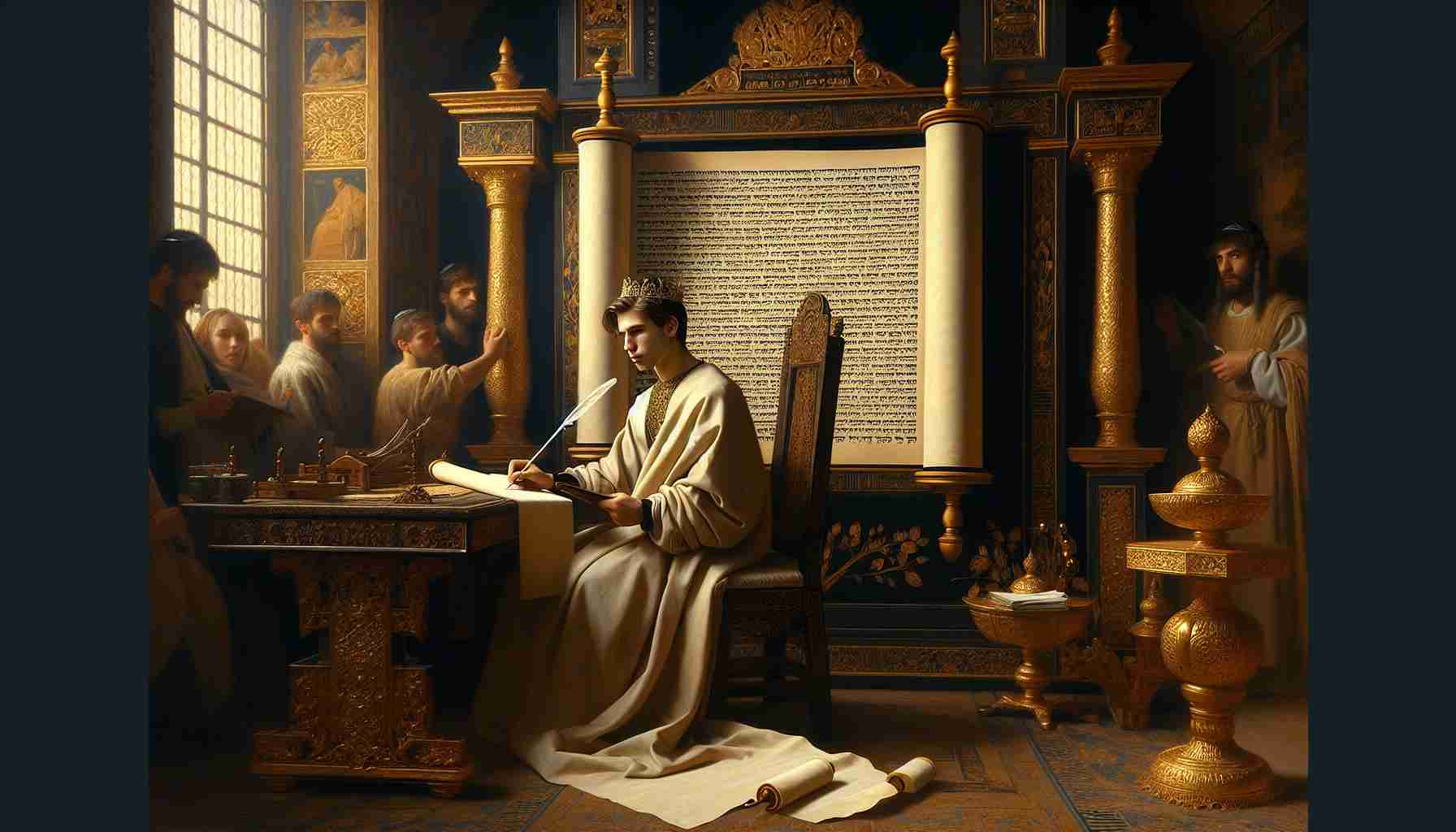

I was no prince, no priest—just a scribe assigned to the king’s court. My name won’t be remembered in stories, but the day I saw a king tremble before the Word of God, I knew history had shifted.
It was the seventh year of King Eliav’s reign. He was young but wise—or at least wise enough to know his limits. Unlike kings in nearby lands, who built armies and gathered gold, Eliav listened. And sometimes, he listened to me.
On the morning it happened, I entered the great hall with fresh parchment and ink. The sun painted golden paths across the stone floor as the king summoned the elders. He stood silently, hands clasped behind his back, facing the open courtyard. I waited in the corner, unnoticed.
Then the high priest entered, holding the scroll.
The scroll.
The one every king of Israel was commanded to write for himself, as taught in Deuteronomy—called Devarim in Hebrew—chapter 17, verses 14 through 20. “When you come into the land… and say, ‘Let us set a king over us,’ he shall write for himself a copy of this Torah…” I had written that scroll with King Eliav. Every word. Every letter. Day after day, we had copied it by hand, with the priest overseeing each line.
That morning, the high priest placed it in the king’s hands.
“This,” the priest said, “will sit beside you. Not above the law, but under it.”
Everyone stood in silence. Eliav held the scroll as if it were weightier than any sword.
“I am king by God’s will,” he said, his voice steady. “But I am bound to His law.”
He lowered his head. “I will not gather many horses, nor take many wives, nor multiply silver and gold for myself.”
These were the exact warnings given to kings in the Torah. I always wondered if anyone would ever take them seriously. And now, here he was—Israel’s ruler, pledging restraint.
It pierced me deeper than I expected.
In the weeks that followed, I noticed the difference. The king read from his Torah daily, just as the commandment said. He posed questions. He adjusted his judgments. He turned away gifts from foreign envoys when they looked suspiciously like bribes. One day, he even returned land that had been seized unjustly by his father.
When I finally asked him why, he simply said, “If I forget who the true King is, I will forget myself.”
It humbled me. I had always thought kings should be feared. But Eliav taught me something else—that real strength comes from kneeling before something greater.
I moved on from court life years later, but the image of him sitting beside that Torah never left me. I still copy scrolls today, older and slower. But I write with hope—that maybe, somewhere, another leader will read these words and remember that royalty, too, must bow.
I was no prince, no priest—just a scribe assigned to the king’s court. My name won’t be remembered in stories, but the day I saw a king tremble before the Word of God, I knew history had shifted.
It was the seventh year of King Eliav’s reign. He was young but wise—or at least wise enough to know his limits. Unlike kings in nearby lands, who built armies and gathered gold, Eliav listened. And sometimes, he listened to me.
On the morning it happened, I entered the great hall with fresh parchment and ink. The sun painted golden paths across the stone floor as the king summoned the elders. He stood silently, hands clasped behind his back, facing the open courtyard. I waited in the corner, unnoticed.
Then the high priest entered, holding the scroll.
The scroll.
The one every king of Israel was commanded to write for himself, as taught in Deuteronomy—called Devarim in Hebrew—chapter 17, verses 14 through 20. “When you come into the land… and say, ‘Let us set a king over us,’ he shall write for himself a copy of this Torah…” I had written that scroll with King Eliav. Every word. Every letter. Day after day, we had copied it by hand, with the priest overseeing each line.
That morning, the high priest placed it in the king’s hands.
“This,” the priest said, “will sit beside you. Not above the law, but under it.”
Everyone stood in silence. Eliav held the scroll as if it were weightier than any sword.
“I am king by God’s will,” he said, his voice steady. “But I am bound to His law.”
He lowered his head. “I will not gather many horses, nor take many wives, nor multiply silver and gold for myself.”
These were the exact warnings given to kings in the Torah. I always wondered if anyone would ever take them seriously. And now, here he was—Israel’s ruler, pledging restraint.
It pierced me deeper than I expected.
In the weeks that followed, I noticed the difference. The king read from his Torah daily, just as the commandment said. He posed questions. He adjusted his judgments. He turned away gifts from foreign envoys when they looked suspiciously like bribes. One day, he even returned land that had been seized unjustly by his father.
When I finally asked him why, he simply said, “If I forget who the true King is, I will forget myself.”
It humbled me. I had always thought kings should be feared. But Eliav taught me something else—that real strength comes from kneeling before something greater.
I moved on from court life years later, but the image of him sitting beside that Torah never left me. I still copy scrolls today, older and slower. But I write with hope—that maybe, somewhere, another leader will read these words and remember that royalty, too, must bow.